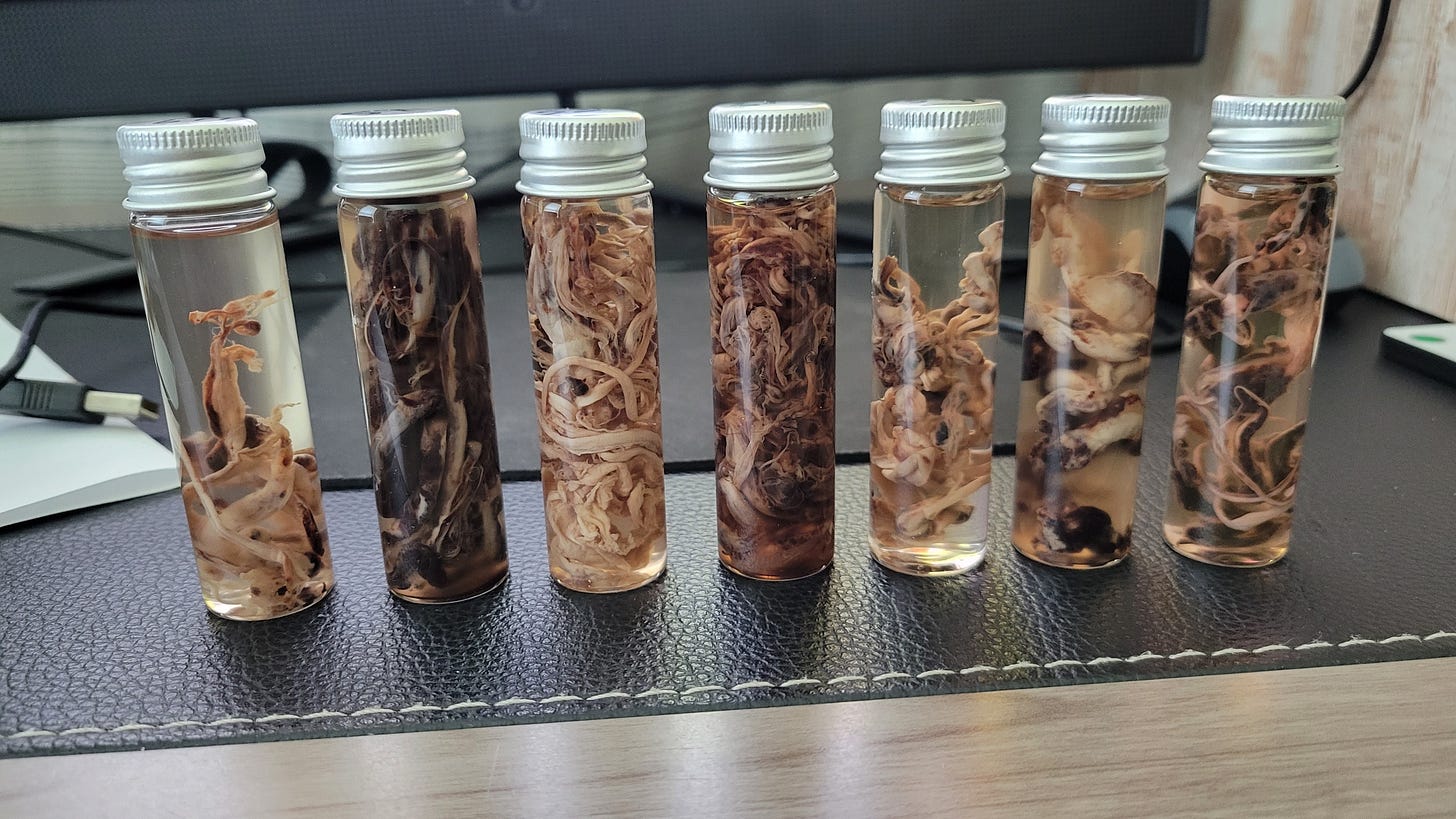Vaxx-Induced Scleroderma & White Clots
Can Scleroderma Theoretically Cause White Fibrous Blood Clots?
The Vaxx-Scleroderma-Blood Clot Link
Overview: Recent evidence suggests that scleroderma, an autoimmune disorder characterized by connective tissue damage, vascular abnormalities, and excessive collagen production, may be linked to the formation of fibrous blood clots. There is emerging speculation that vaccine-induced immune responses could play a role in triggering or exacerbating scleroderma, leading to the development of these challenging blood clots. This overview explores the potential connection between vaccines, scleroderma, and the formation of fibrous blood clots.
Scleroderma Pathogenesis and Fibrous Clot Formation
Vascular Damage: Scleroderma leads to damage to small blood vessels and endothelial dysfunction, resulting in impaired blood flow. This damage sets the stage for abnormal clotting. The vasculopathy (narrowing of blood vessels) in scleroderma increases the risk of fibrous blood clot formation due to reduced circulation and altered blood flow dynamics.
Collagen Deposition: The hallmark of scleroderma is excessive collagen production, which leads to the thickening and hardening of connective tissues, including those in blood vessels. This excess collagen can become incorporated into blood clots, making them more fibrous and rigid. These fibrous clots are more resistant to standard treatments, posing significant clinical challenges.
Immune Dysregulation: As an autoimmune disease, scleroderma triggers chronic inflammation, which further disrupts vascular integrity and promotes abnormal clotting. Activated immune cells release pro-inflammatory cytokines and increase the production of fibrin, a protein that plays a key role in clot formation. This can contribute to the creation of fibrous clots that are harder to resolve.
Potential Vaxx-Induced Scleroderma and Clot Formation
Vaccine-Induced Immune Response: Certain vaccines, particularly adenovirus-based ones (such as AstraZeneca), have been linked to rare but serious immune-mediated thrombosis. These vaccines can trigger autoimmune responses that may exacerbate underlying autoimmune conditions like scleroderma. In genetically predisposed individuals, the immune activation induced by the vaccine could provoke the onset or worsening of scleroderma, thereby increasing the risk of developing fibrous blood clots.
Heavy Metal Toxicity: The presence of heavy metals in the body, whether due to environmental exposure or as a potential vaccine component, can lead to oxidative stress. This stress can cause vascular damage, enhancing the likelihood of clot formation. In those with pre-existing autoimmune conditions like scleroderma, this could further increase the risk of forming fibrous blood clots that are difficult to treat.
Synergistic Effects of Autoimmune Activation and Clotting: The combination of autoimmune dysregulation triggered by vaccines and pre-existing vascular issues in scleroderma could lead to accelerated clot formation. This interaction may contribute to the development of large, rubbery, fibrous clots that resist standard anticoagulant therapies, complicating management.
Challenges with Fibrous Clots and Treatment
Fibrous clots are significantly more difficult to treat than traditional fibrin-based clots. Their rigid structure and resistance to anticoagulants make them less responsive to conventional therapies. This poses a major clinical issue, as these clots can lead to ischemic events and organ damage.
Enzyme-Based and Anticoagulant Therapies
Enzyme-Based Treatments: Several enzymes may help break down the fibrous tissue in clots, including:
Collagenase: Breaks down collagen, a key component of fibrous tissue.
Matrix Metalloproteinases (MMPs): Involved in tissue remodeling, breaking down collagen and extracellular matrix proteins.
Serrapeptase: A fibrinolytic enzyme that may aid in dissolving fibrin and fibrous deposits.
Plasmin: Though typically involved in fibrinolysis, plasmin’s proteolytic activity might help degrade the fibrous components of these clots.
While standard blood thinners (e.g., warfarin or heparin) are often used to prevent clot formation, they may be less effective in breaking down fibrous clots. In such cases, more intensive or specialized treatments may be necessary. Personalized therapy is crucial to address the challenges of these resistant clots.
Disclaimer: I am not a medical professional. This information is for general purposes only. Consult a qualified healthcare provider for medical advice.







Thanks for the link and look into your rabbit hole.
I'll definitely look into your therapeutics.